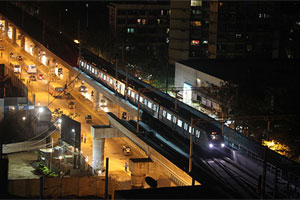With a couple of movie tickets found on an unidentified dead body as their only lead, the Wadala police scoured the bylanes of Madanpura and Grant Road for more leads. The trail led to a commercial sex worker who gave the police their first breakthrough, eventually leading them to the killer, finds out Gautam S Mengle
When the Wadala police found an unidentified body in June this year, no one in the police station thought it would take over a month to investigate the murder. Their only lead then were two movie tickets.
In the early hours of June 3, a man in his 40s was found stabbed to death on Container Road in Wadala. A passing motorist informed the police control room and the body was taken to the Sion hospital for post mortem examination. The deceased had been stabbed several times in his throat and torso, and a complaint of murder was registered against unknown persons.
The police searched the man’s pockets to check for clues. The only thing they found were two movie tickets bought at Nishat Cinema in Nagpada.
The police sent a team to the cinema hall. And then began a seven-day chase through old world lanes of Madanpura and Grant Road.
“The manager at the cinema hall told us that most of his patrons were people of the labor class, who brought prostitutes from the neighboring red-light area for a movie,” said sub-inspector Shakir Patel of the Wadala police station.
Regular visitors to red-light areas form a regular association with their favorite commercial sex workers over repeated visits. They exchange numbers and start taking the women out for dinner, drinks and movies. The sex workers, in turn, encourage this association simply because it means good business. In fact, their “managers” make sure these associations are encouraged and sustained. As in the case with bar girls, such clients of sex workers start believing they are preferred clients and don’t mind paying an extra couple of hundred rupees to the sex workers. Over time, genuine affection sometimes blooms between the client and the sex worker. This was the association that the police decided to explore.
Meanwhile, the face of the deceased was photographed and the bloodied part was “rectified” using a computer software in order to make it less disturbing to the viewer. More than 3,000 copies of the “cleaned up” version was printed out and distributed among a team of 10 constables who went back to the red light area near the cinema hall. They started circulating the copies among the commercial sex workers and their managers in the area, who were asked if they had ever seen the man in the photograph. The policemen also left copies of the photographs in the brothels just in case someone saw it and remembered something.
After seven days of wandering through the myriad lanes of the red-light area, the police zeroes in on a commercial sex worker, whose identity has been withheld.
“The woman took one look at the photograph and flew into a panic, asking if something was wrong. Not knowing how she would react, we told her the man had been in an accident. She started crying. After she regained composure, she told us that the man was a regular client of hers, and that his name was Shikar Khan (40). She also told us he would regularly visit the brothel with along his friend, named Anurul Sheikh, a West Bengal native who would keep coming to Mumbai often,” said Patel.
Encouraged that they now had two names to follow, the police set about chasing the new leads. Inquiries were initiated to find out any information about a 40-year-old man named Shikar Khan as well as to check whether a missing person’s complaint had been registered in his name. Meanwhile, a team was sent to West Bengal to track Sheikh, a contractor by profession. The police finally found him and brought him to Mumbai for questioning.
As the police were investigating the case from all angles, Sheikh was as much a suspect as a witness.
However, sustained questioning failed to throw up any indication that Sheikh had killed Khan. He could only tell the police that Khan was a carpenter by profession who worked on a contract basis. Sheikh added he had once hired Khan along with several others for a construction job in Mumbai, and that one of the people he had hired along with Khan had a crippled leg, with whom Khan would have frequent and bitter arguments.
“Langde ko dhoondh lo, sahab, aap ka kaam ho jaayega (Find the cripple, sir, and your work is done),” Sheikh told the police.
The police then picked up several carpenters based in Nagpada and finally zeroed in on Shrihari Dalabi (37), who fit the description that Sheikh had given. Dalabi was picked up for questioning and allegedly confessed to having killed Khan during a drunken altercation that occurred between them on the evening of June 3. Dalabi claimed the long-standing hard feelings between him and Khan had led to the extreme step. Dalabi and Khan would frequently work for the same contractor but never got along well, the police said.
“Dalabi said during interrogation that whenever they would have an argument, Khan would abuse him loudly and in full public view and that he was looking for a chance to avenge this humiliation. Khan would use extremely humiliating words in front of their colleagues and say that if Dalabi thought he was worth a penny, he was wrong,” said Deputy Commissioner of Police (Port zone) Tanaji Ghadge.
On June 2, Khan, Dalabi and their mutual friends Suraj Rishidev (23) and Mohammed Mansoori (22) went to the Royal Country Bar for a drink and an argument broke out between Khan and Dalabi after they had both consumed a few drinks.
Khan and Dalabi were fighting loudly and abusing each other even after they left the bar and took a taxi to go to their residences in Reay Road. However, the taxi driver forced them out of his taxi some distance before their destination, as he could not take their bickering any more. As they were passing the railway tracks adjacent to the road near the Reay Road railway station, Dalabi allegedly took out a small chopper he was carrying and stabbed Khan several times. The trio then allegedly dragged the body into some bushes and fled the scene.
Dalabi was placed under arrest following his confession on July 15. Rishidev was also picked up and arrested. The police then launched a manhunt for Mansoori, who had fled to Delhi after learning that Dalabi had been picked up. A team of policemen went to Delhi but could not find him. However, the police received a tip-off that he was coming to Agripada on July 21. They laid a trap and arrested him from Agripada the same day.
It was found during the course of the investigation that the tickets were never used.
Source






